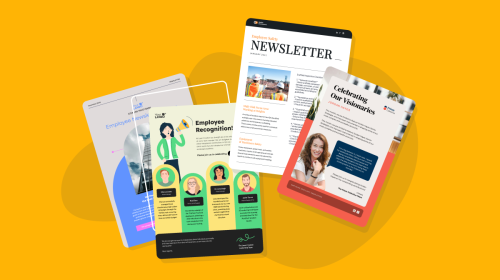
How to Write Outstanding Business Letter for Various Purposes

Digital channels like emails, slack and social media have quickly become a major means of communication in business settings. And it appears like the age-old business letters have become outdated.
However, you will probably still need to write a variety of business letters over the course of your career, including cover letters, memos, sales letters and resignation letters.
Plus, business letters showcase a sense of professionalism that emails and other digital messaging can’t match.
So, how do you write great business letters? This article will show you how to write business letters that truly stand out. We'll also discuss the types of business letters along with customizable templates you can use.
Table of Contents
- What is a Business Letter?
- Business Letter Format Example
- How to Write a Business Letter
- 10 Main Types of Business Letters
Quick Read
- Business letters are official documents used for individual-to-business or business-to-business correspondence.
- There are three main business letter formats: block format, modified block format and semi-block format.
- Follow these steps to create a business letter: Define the letter's purpose and audience, write the heading, write the salutation, compose the body and sign off professionally.
- The common types of business letters include termination letters, product complaint letters, thank-you letters, sales letters, proposal letters, resignation letters, internal communications letters, invitation letters, sponsorship letters and internal communications letters.
- Visme offers dozens of professionally designed letter templates and features that'll help you create excellent professional letters in minutes.
What is a Business Letter?
A business letter is a formal document used for communication between companies, or between a company and an individual. It should be clear, concise and written in a professional tone.
Business letters can be written for a wide range of purposes, including recommendation letters, letters of intent, cover letters, offer letters, sales letters, complaint letters, follow-up letters, invitation letters, resignation letters and more.
Business Letter Format Example
There are three main formats for writing business letters and they include:
Block Format
In the block format, all the letter parts are left-aligned and paragraphs are not indented. This format is commonly and widely used for business letters.
Modified Block Format
The modified block format is similar to the block format, but the date, closing and signature are aligned to the right margin. Paragraphs are also not indented in this type of format.
Semi-Block Format
The semi-block format is also structured like the block format. However, the paragraphs are indented, and in some cases, only the first lines of each paragraph are indented.
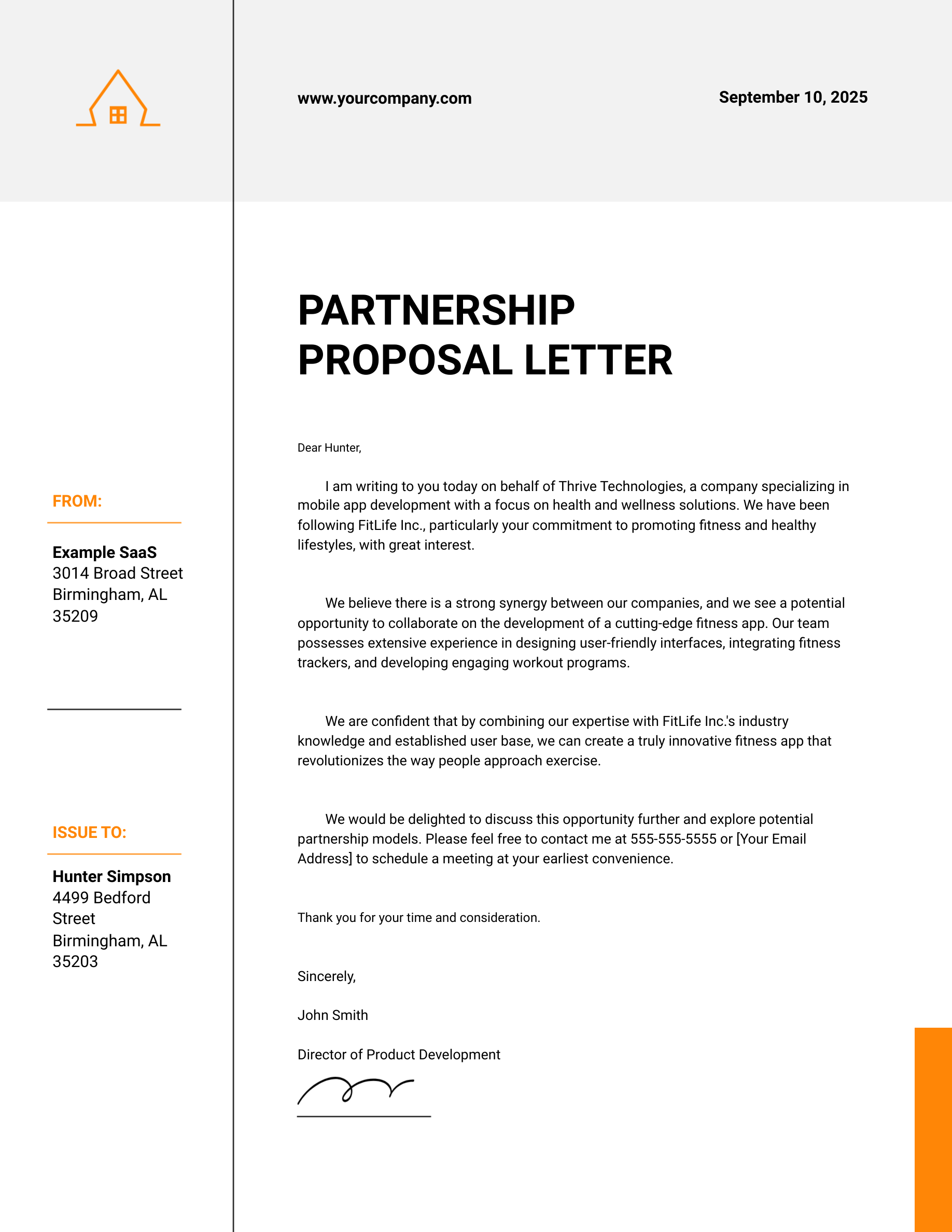
How to Write a Business Letter
Define the Letter’s Purpose and Audience
Before you start writing, identify the specific reason for your letter.
Are you requesting information, making a complaint, proposing, or following up on a previous conversation? Clearly defining your objective will guide your letter’s focus and ensure relevance.
Next, consider your audience. Who are you writing to?
Knowing the recipient’s role, concerns and expectations will help you tailor your message effectively.
It will also influence your tone, the level of detail you provide and the presentation of your arguments or requests.
Write the Heading
Start your letter with a clear and concise heading. The heading of your business letter establishes the formal context of the correspondence.
Start this section with your full name and job title or the company name, depending on the type of letter you’re writing.
Follow this by providing your mailing address. You could also include your phone number to make it easy for the recipient to contact you if needed.

Alternatively, you can use a company letterhead instead of writing your business and contact information, as these details are already at the top and bottom of the page.

Apart from replacing the sender’s information, letterheads add visual appeal to the letter and enhance professionalism.
The good news is they’re easy to create using Visme’s letterhead maker. Choose from a library of beautiful letterhead templates and customize them with your brand assets, such as logos, fonts and colors.
Date
Directly below your contact information, write the full date you finished the letter.
This information is crucial for record-keeping and helps the recipient understand the timeline of your communication. Use a clear and formal date format.
If you’re writing your letter in British English, use a format like 6th June, 2024. However, if you’re writing in American English, write it as June 6, 2024.
Recipient’s Information
This section, also known as the inside address, includes your full name, job title, company name and mailing address. The recipient’s address typically appears in the top left corner of the letter, below the sender’s information and date.

Write the Salutation
After the recipient's address, leave one-line spacing before writing the salutation. To keep your salutation formal and polite, address the recipient with “Dear” followed by their official title (Mr., Ms., Dr., etc.) and last name (e.g., Dear Mr. Smith).
If you don't know the recipient’s name, use "To Whom It May Concern." Then, close the salutation with a comma and leave another one-line spacing to begin the body of the letter.
Compose the Body of the Letter
The body of the letter is the heart of your message and requires careful consideration. Every word should contribute to your message.
While there are no strict rules regarding length, aim for conciseness while ensuring clarity and impact.
A well-structured body typically follows this logical organization:
Introduction—Main content—Conclusion
Introduction
Start the body of your letter with a polite opening and clearly state the purpose of your letter in the first paragraph. It sets the tone and tells the recipient what to expect.
Main Content

In the subsequent paragraphs, provide the necessary background information and present your main points logically. Include specific context related to the letter’s purpose to help the recipient understand the present issue.

Clearly state any actions you expect from the recipient, including deadlines if applicable. Offer assistance or provide contact information for further clarification, ensuring your message is comprehensive and actionable.
Conclusion
In the final paragraph, briefly recap the main points of your letter and thank the recipient for their attention. Close with a courteous sentence that reinforces your request and expresses your anticipation of their response.
Here are some tips to ensure clarity and professionalism when writing the body of your letter:
- Maintain a Professional Tone: Use polite and formal language. Avoid slang, abbreviations and overly casual expressions.
- Use an Active Voice: The active voice is generally more clearer and direct than passive voice. For example, use "We will send the documents" rather than "The documents will be sent by us."
- Be Specific and Precise: Clearly state what you need or what you are providing.
- Keep Paragraphs Short: Long paragraphs can be overwhelming. Aim for three to four sentences per paragraph to improve readability.
- Stay On Topic: Stick to the main purpose of your letter. Avoid introducing unrelated topics.
- Proofread: Typos and grammatical errors can undermine the credibility of your letter or cause miscommunication. Therefore, you need to proofread your business letters.
Does writing or editing your letters stress you out? Visme’s free AI writer can assist you.
Not only can the tool help you generate first drafts of your letters, but it can also help you edit and refine your letters. Simply input a detailed prompt and the wizard will generate the result in seconds.
Sign-off Professionally
Signing off leaves a final impression on your recipient. Hence, ensure it’s professional, reinforcing the overall tone of the letter.

The components of a good sign-off include:
Closing phrase: Choose a professional and courteous closing phrase, such as "Sincerely," "Best regards," or "Yours faithfully."
Use “Sincerely” when you know the recipient’s name and have addressed them directly. If you have an ongoing relationship with the recipient, such as colleagues, clients, or business partners, “Best regards” is suitable. However, if you don’t know the recipient, such as in cover letters, then “Yours faithfully” is ideal.
Signature: If you intend to print the letter, leave a few lines of space (usually three to four) for your handwritten signature. You can use a scanned signature image or type your name for digital letters.
Name and Title: After you have signed it, type your full name. If applicable, include your job title below it.
Enclosures: If you’re including additional documents with your letter, indicate this by typing “Enclosures” or “Attachments” below your letter, followed by a brief description or the number of items enclosed.
10 Main Types of Business Letters (+ Templates)
1. Termination Letter
Whether you’re terminating the service of an employee, contractor, or vendor, it’s important to show empathy and respect. Instead of sending an email, use a termination letter to demonstrate professionalism. While it isn’t the easiest to write, you want to ensure the letter:
- Is direct and clear about the reasons for termination.
- Maintains a respectful and professional tone.
- Complies with employment laws and company policies.
- Provides all pertinent information, including next steps and any support offered.
For example, the vendor termination letter template above expresses gratitude for past good work while clearly stating the reasons for the contract termination.
You can edit it to match your specific reasons for termination.
Explore Visme’s template library for other termination templates specific to freelancers, employees and influencers.
To make customization snappy, automatically add your brand assets to the template using the brand wizard tool. Input your website's URL and the brand wizard will generate a brand kit with your brand elements—logo, fonts, icons, colors and all. The brand wizard then customizes the templates with your branding.
2. Product Complaint Response Letters
Customer complaints are inevitable. But how you address these concerns can significantly impact your customer relationships. According to a report by Zendesk, three out of four customers are willing to spend more with businesses that provide excellent customer experiences.
Complaint response letters can improve customer experience by demonstrating a company’s commitment to customer satisfaction and resolving issues effectively.
A complaint response letter typically begins by acknowledging the customer’s concern and apologizing for any inconvenience.
It then clarifies the issue and the steps you’re taking to resolve it. The letter concludes by reaffirming the company’s dedication to delivering quality service and inviting further communication if needed.
Below is an example of a product complaint response template in a modified block format. If you prefer the block format, feel free to tailor the content to suit the specific customer complaint and align the date to the left.
You can add interactive elements such as pop-ups, buttons and links to customer support videos or resources that provide additional information about the complaint.
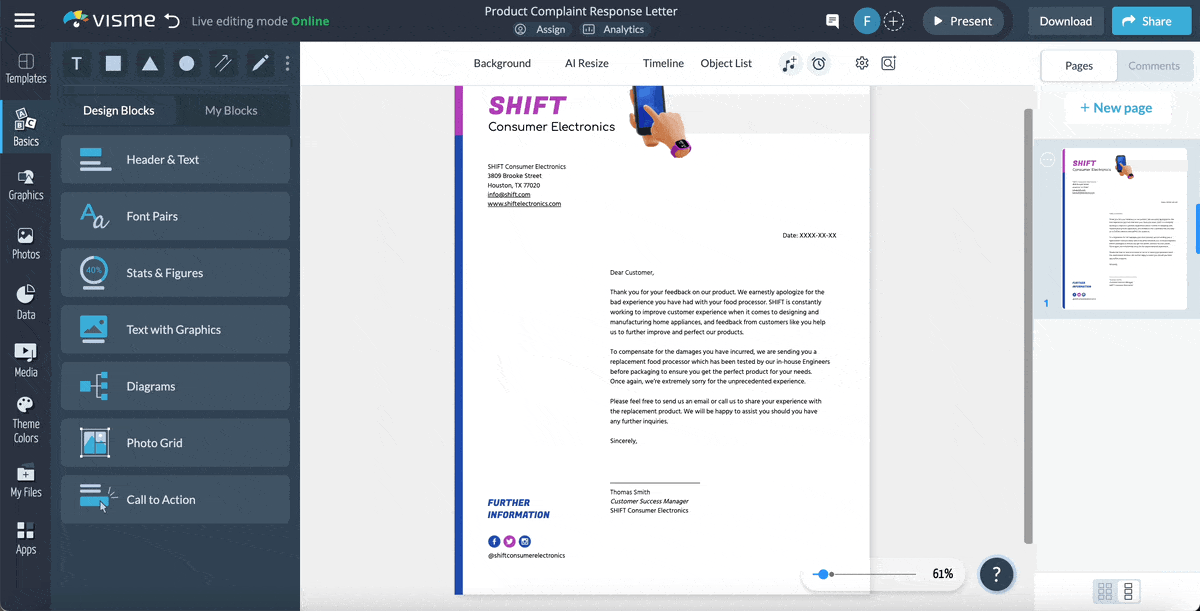
3. Thank-You Letters
Thank-you letters are essential in business. They convey gratitude and recognize the effort or support received from colleagues, clients, or partners. This practice enhances teamwork, fosters client loyalty, and strengthens business relationships.
As shown in the template, thank-you letters start with a warm greeting, a sincere expression of thanks, a specific mention of the action being appreciated and a closing that reinforces gratitude and encourages continued interactions.
After personalizing the letter, you can share it via a link or print it out and attach it to a physical gift to further emphasize your appreciation.
4. Sales Letters
Sales letters are vital marketing materials for promoting products or services to potential customers. They are useful to generating leads, drive sales and increasing brand awareness.
A well-crafted sales letter grabs the recipient's attention with an engaging introduction, clearly outlines the product or service’s benefits and includes a persuasive call to action.
For example, the B2B sales template below acknowledges the customer’s loyalty and provides details about the offer and value proposition. It then concludes with a call to action, prompting recipients to seize the opportunity.
Before you send out your letter, it’s best to get an extra eye on it. Use Visme's collaborative feature to invite your team to view, comment, or edit the content or design to ensure the letter achieves the desired results.
5. Proposal Letter
If you aim to secure contracts, partnerships, or funding, use proposal letters to provide a detailed plan and persuade the recipient to consider the proposal.
Use the professional proposal letter template below to jumpstart your writing. The template starts with a summary of the proposal's intent. Next, it outlines the reasons for the proposal and expected outcomes. The letter then ends with a recap of the main points and encourages the recipient to take action.
You can download your letter in PDF format, attach it to an email, or generate a link to embed the letter in an email.
6. Resignation Letter
Handling resignations isn't always a walk in the park, but doing it right makes things go smoothly.
Typically, it begins with a clear statement of resignation, followed by details about the intended last working day and an expression of gratitude for the opportunities provided by the employer.
Use the Visme template below to create a professional resignation letter. With a few clicks, you can replace placeholder content and have your letter ready in minutes.
7. Internal Communication Letter
Internal communication letters are used within an organization to disseminate information, updates or announcements to employees.
These letters are essential for informing all organization members about important matters and promoting transparency and unity in the company.
They usually start with a brief introduction to the topic, followed by the main content and details about the announcement or update. At the end of the letter, any required employee-related activities are included, along with a closing statement that invites questions or feedback.
You can adapt the internal communication letter template below to a variety of internal needs, such as announcing a new initiative, updating policies, or celebrating a team achievement. Don't forget to utilize your company’s letterhead and sign off to make it official.
8. Invitation Letter
You need invitation letters to invite individuals or groups to events, meetings, or gatherings.
A well-crafted invitation letter sets the tone for the event, provides essential details and generates interest.
Typically, an invitation letter begins with a friendly greeting, a brief introduction, event details like (date, time, location and purpose) and the significance of the recipient's attendance. The letter then concludes with a polite request for an RSVP and a closing remark that conveys enthusiasm about the event.
You can easily personalize the template to suit your needs and make it feel true to your personal brand.
9. Sponsorship Letter
Sponsorship letters are crafted to request financial support or resources from organizations or individuals for events, projects, or activities. A well-written one can help secure the necessary funding and support crucial for the success of these initiatives.
Before writing, ensure your target audience aligns with the cause and gather personal details to personalize the letter effectively.
Start by introducing the sender and providing context about the event or project. Then, make a specific support request and clearly outline the benefits, as demonstrated in the sponsorship donation template below.
When dealing with busy professionals, follow up to ensure timely feedback. Use Visme’s analytics to track views and know when follow-up communication may be necessary.
10. Employee Welcome Letter
Employee welcome letters are your HR team’s opportunity to make a positive impact, ensuring new hires feel valued and excited about their role from day one.
Begin your employee welcome letter with a welcoming statement followed by brief information about the company. Next, give an overview of the new employee’s roles and the company’s commitment to supporting a healthy work environment.
End the letter by expressing enthusiasm about the new employee joining the team and providing contact information for questions.
Feel free to link to the details of the onboarding process so new hires know what to do or expect and when.
Utilize this employee letter template to create an impactful and motivating employee welcome letter. Customize it with your own branding and messaging and even add or remove pages as needed.
Business Letter FAQs
What Is the Purpose of a Business Letter?
The purpose of a business letter is to communicate formally with external parties or within an organization to convey information, make requests, or address issues.
How Do You Start a Business Letter in the First Sentence?
Begin a business letter with a polite greeting or acknowledgment of the recipient. For example, you can start with “I hope this letter finds you well.”
What Should Be Avoided in a Business Letter?
Avoid using slang, jargon, overly casual language, ambiguous statements and emotional language in business letters.
The letter below serves as an illustration of an informal tone, featuring slang, jargon, and overly casual language.
Hey Bob,
Hope you're good! Wanted to touch base about the new project. It will be lit! But some stuff has to be worked out because the timeline is kind of fuzzy.
Here’s a more formal version:
Dear Bob,
Hope this letter finds you well. This is a quick note to confirm the project timeline and deliverables. Attached is the detailed project plan.
What Are the 7 C's of a Business Letter?
The 7 C's of a business letter are Clarity, Conciseness, Consideration, Concreteness, Courtesy, Correctness and Completeness.
Let’s take a quick look at each of these elements:
- Clarity: Keep your message simple and clear.
- Conciseness: Be brief and to the point. Avoid unnecessary words or details that do not help your message.
- Consideration: Use a tone appropriate for the relationship and context.
- Concreteness: Give details and facts instead of vague statements.
- Courtesy: Respect the recipient and show appreciation when appropriate.
- Correctness: Avoid grammatical, spelling and punctuation errors. Also, be sure the information you give is accurate and current.
- Completeness: Include all the information in your letter. Answer any questions the recipient may have and provide all details to avoid back-and-forth communication.
Create Professional Business Letters with Visme
Regardless of your role within a corporate setting, writing business letters is inevitable. However, it doesn't have to be an intimidating task.
Visme provides a variety of business letter templates and features to help you create professional business letters seamlessly. You can easily incorporate your branding, add a professional letterhead or make it more interactive by embedding videos, links and hover effects.
The best part, Visme AI writer can give you a creative head start when writing your letters. Just describe what the letter should feature and watch the AI perform its magic in seconds.
Beyond creating business letters, Visme helps you create all kinds of professional business content, such as sales plans, one-pagers, proposals, presentations and reports. No professional design skills are required.
Sign up today to start creating professional business letters that stand out.
Create Stunning Content!
Design visual brand experiences for your business whether you are a seasoned designer or a total novice.
Try Visme for free


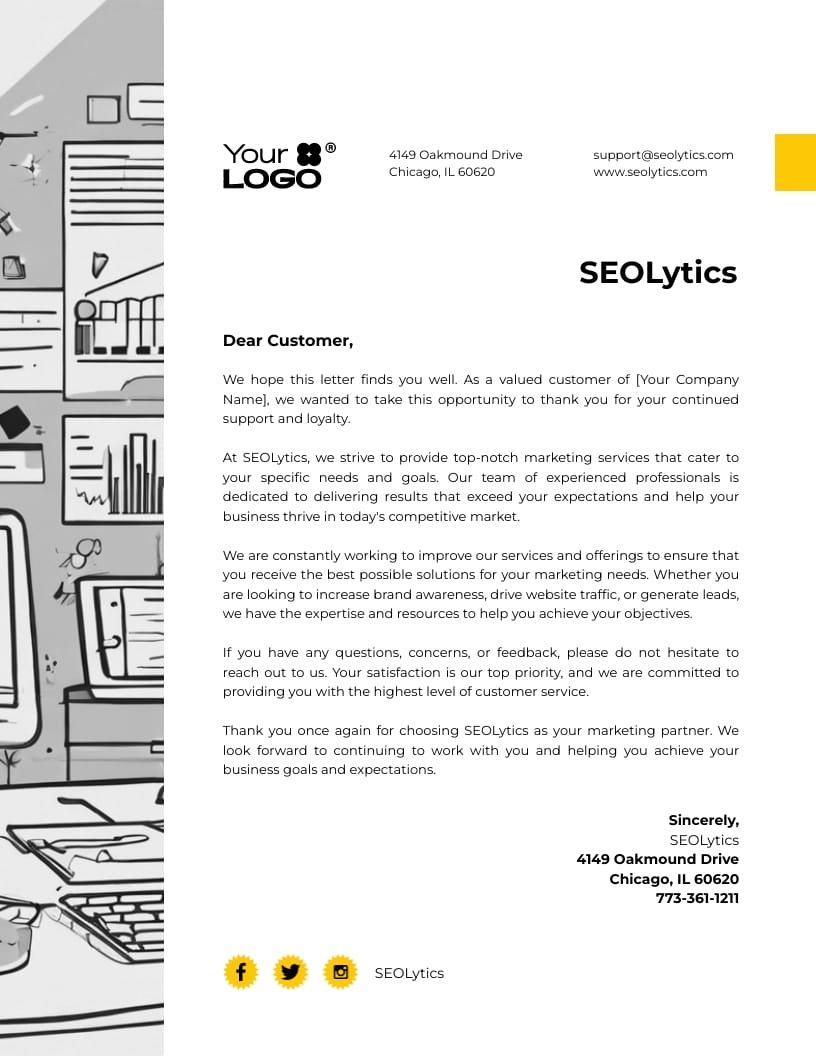












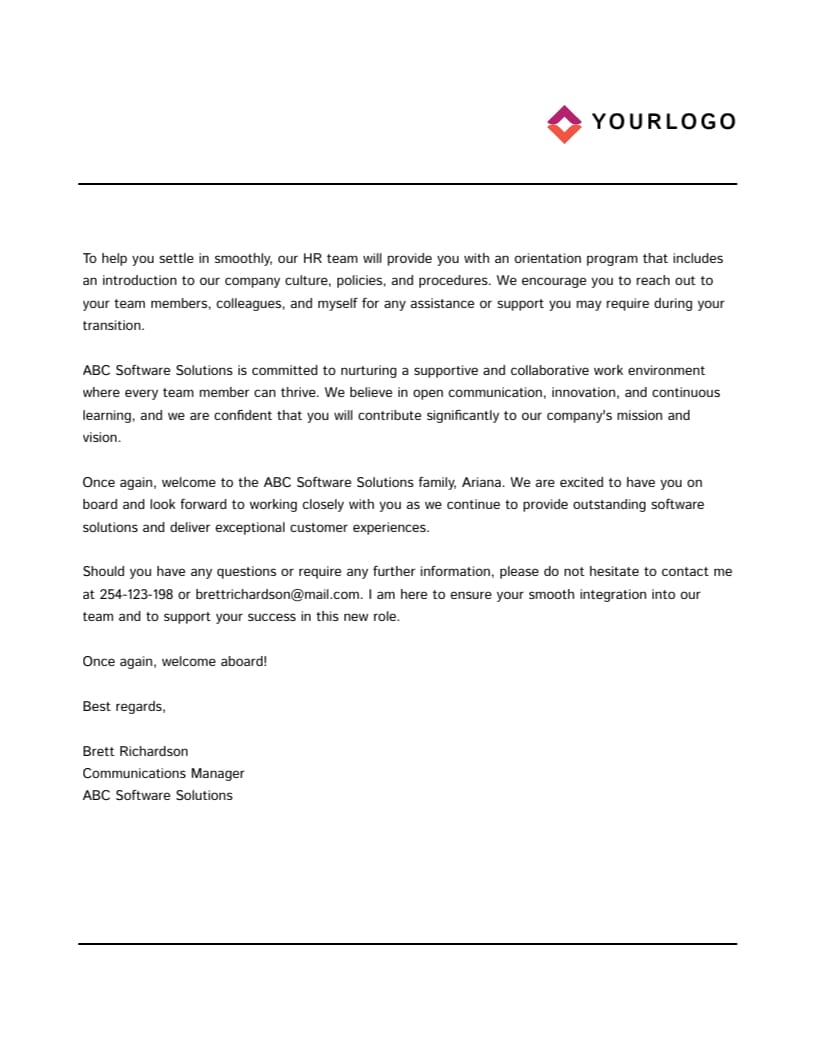



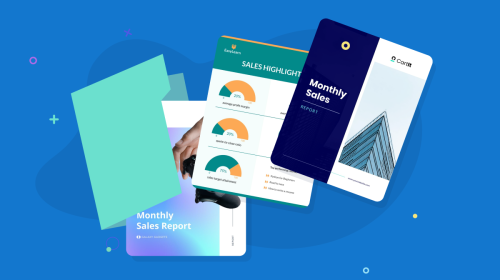
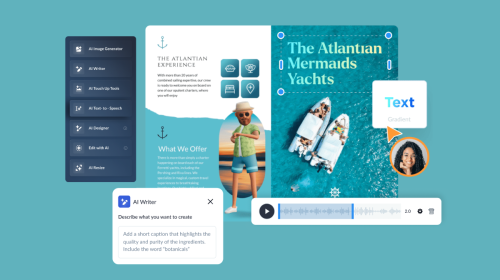
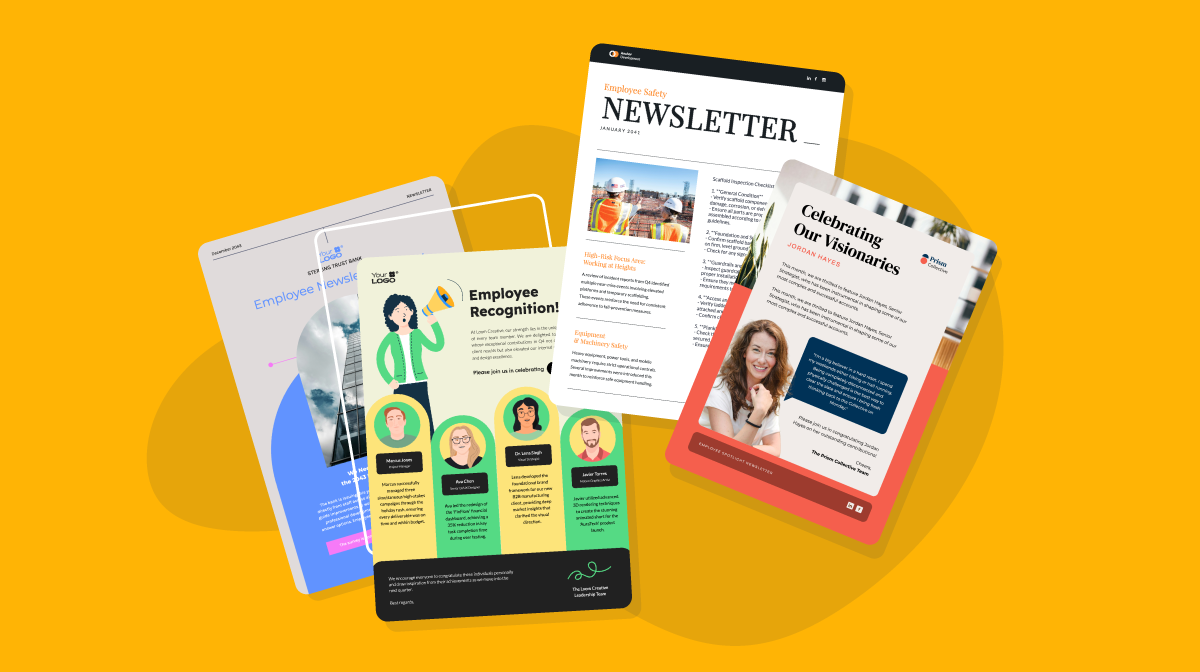
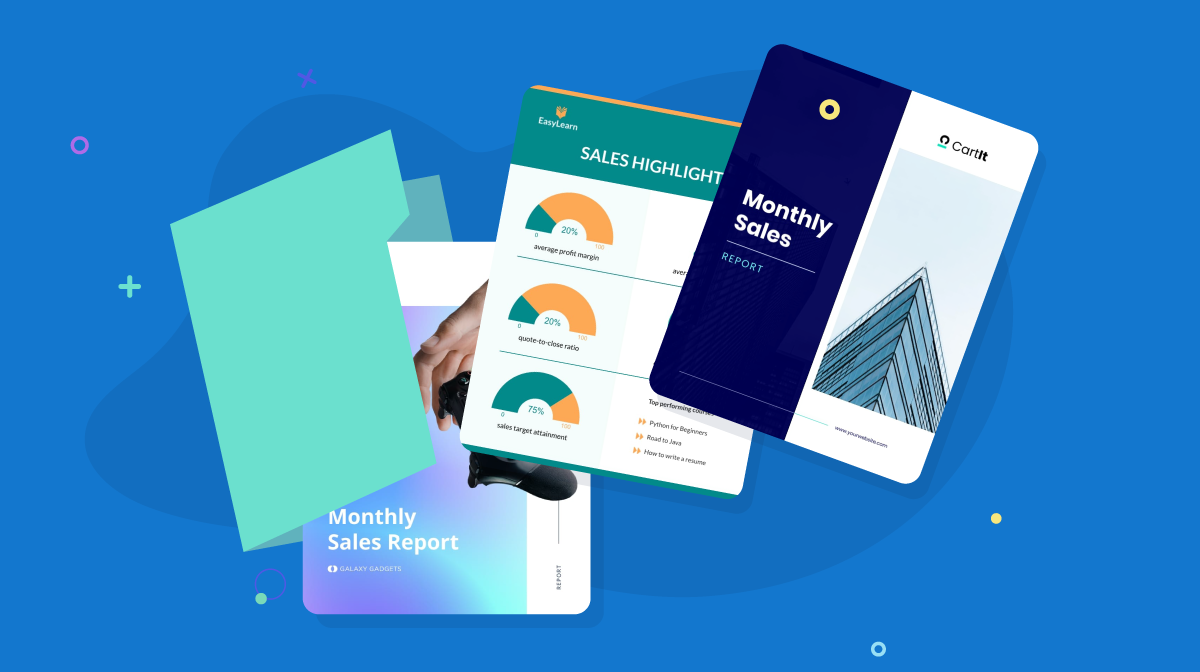
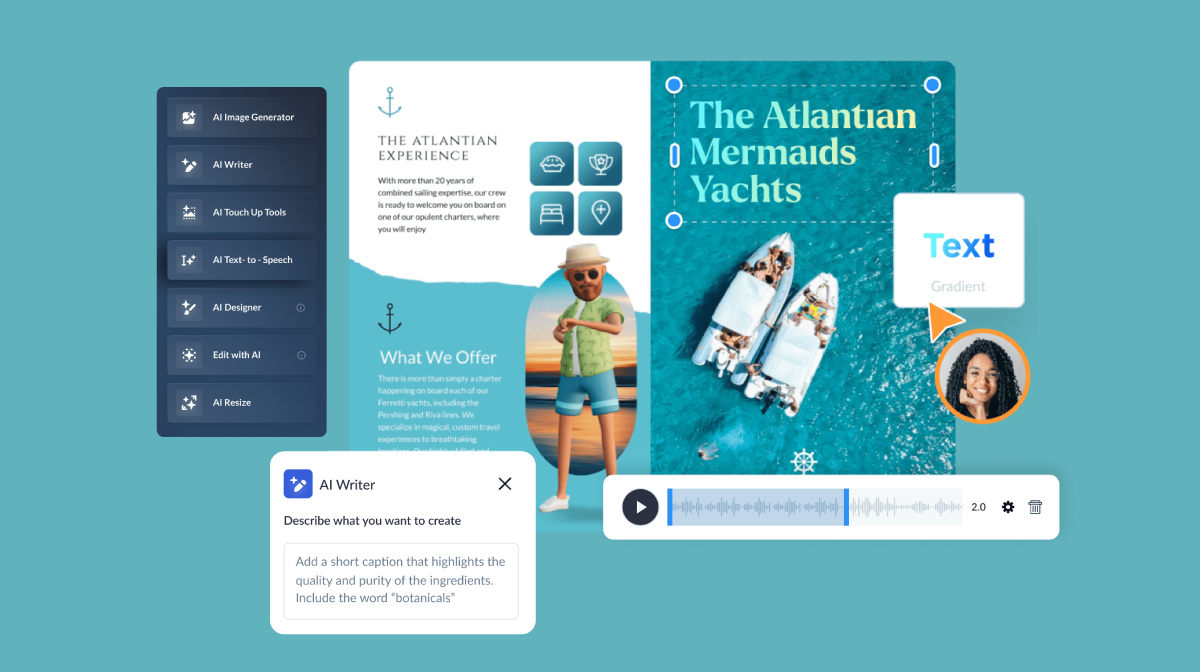
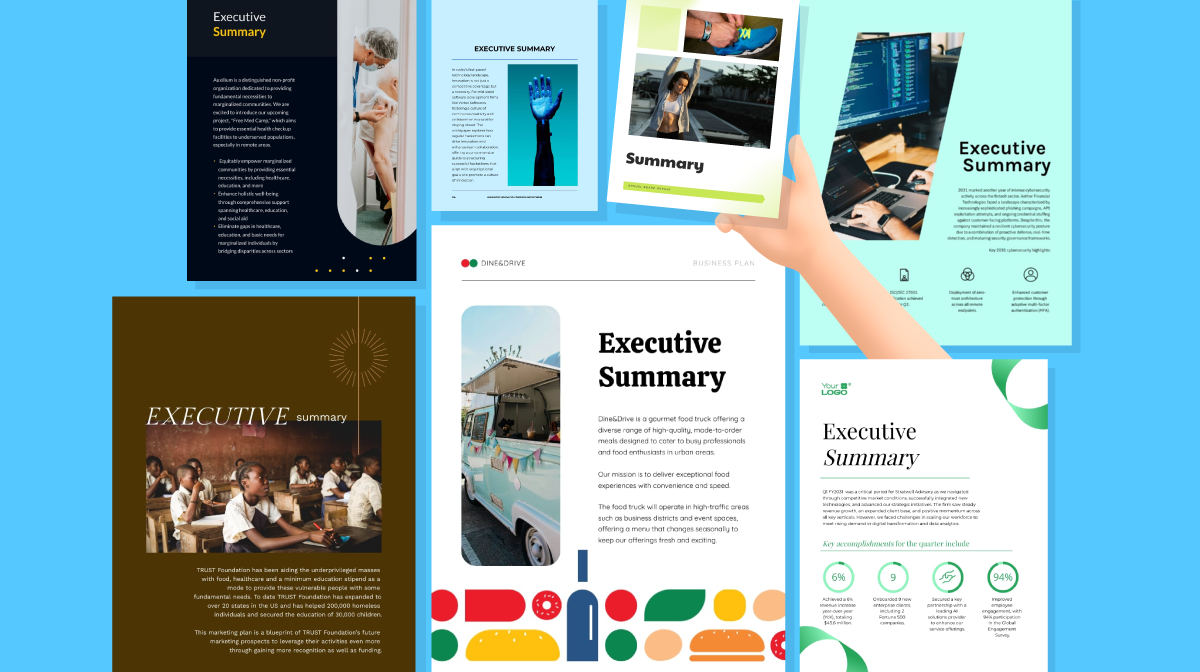
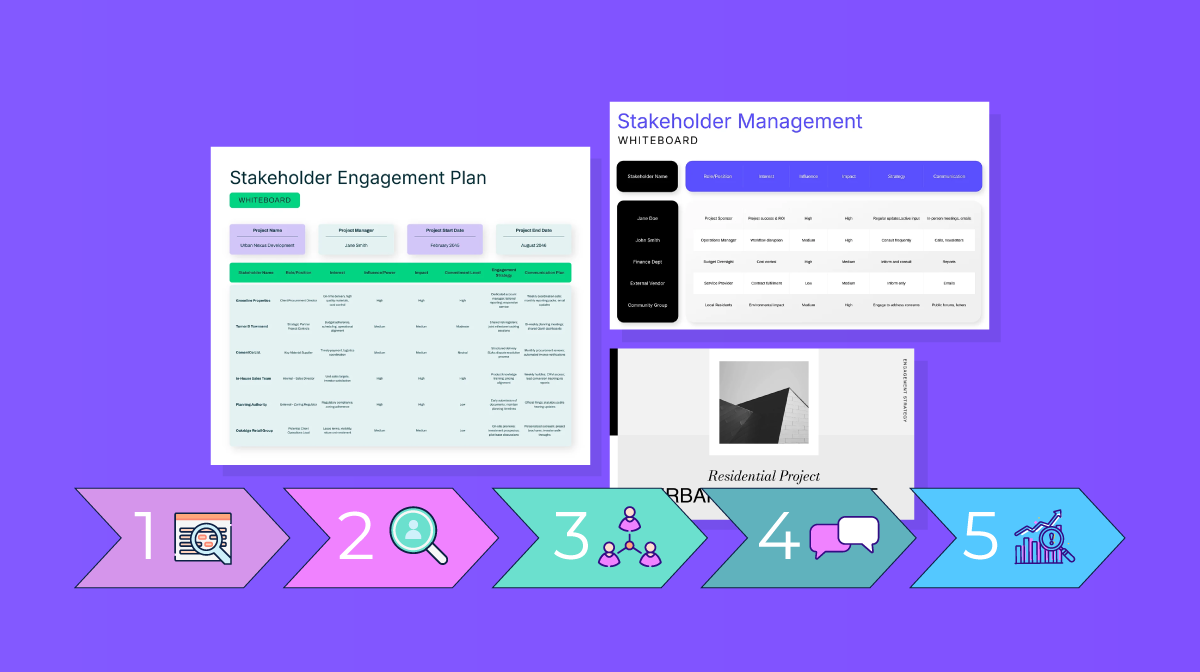
![How to Create a Practical Crisis Management Plan [+ Templates]](https://visme.co/blog/wp-content/uploads/2025/07/How-to-Create-a-Practical-Crisis-Management-Plan-Thumbnail.png)